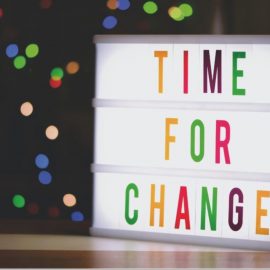

This article is an excerpt from the Shortform book guide to "Your Erroneous Zones" by Wayne Dyer. Shortform has the world's best summaries and analyses of books you should be reading.
Like this article? Sign up for a free trial here.
What are the best Your Erroneous Zones quotes? Do you feel trapped by self-limited beliefs?
The only things getting between you and your happiness are “erroneous zones.” These are behaviors that prevent you from growing as a person and getting outside your comfort zone.
Continue reading to learn more about these erroneous zones with quotes from Wayne W. Dyer’s book.
Quotes From Your Erroneous Zones
In Your Erroneous Zones, Wayne W. Dyer writes that you can be happy—if only you’d stop getting in your own way. Dyer argues that the only things standing between you and your happiness are your “erroneous zones”: self-defeating practices that paralyze you and keep you from living a fulfilling life. By recognizing these hurdles and understanding why you have them, you’ll be able to eliminate them and start living the life you want.
Let’s look at the most insightful Your Erroneous Zones quotes with context.
“Feelings are not just emotions that happen to you. Feelings are reactions you choose to have.”
Happiness may seem elusive, but Dyer asserts that you can choose to be happy at any moment, regardless of what’s happening around you. The problem, says Dyer, is that you prevent yourself from being happy by allowing unproductive emotions to rule.
Dyer argues that feelings aren’t passive occurrences; rather, they’re active reactions within your control. While anger, disappointment, or other emotions may seem valid, you should look at them through one lens: Do these emotions fulfill you or defeat you?
If the feelings defeat you by leading you to self-sabotaging behaviors—if they prevent you from taking action that leads to your growth and fulfillment—then Dyer says you’ve run into an erroneous zone. Some examples of erroneous zones are: needing to please other people, being unable to focus on the present, and procrastination.
“There are two days in the week about which and upon which I never worry. Two carefree days, kept sacredly free from fear and apprehension. One of these days is yesterday…and the other day I do not worry about is tomorrow.”
Dyer argues that you trap yourself in the past by holding onto self-limiting beliefs and memories that don’t serve you. You may have self-imposed labels (for example, you’re scatterbrained) or believe you are bad at doing some things (like math or art) because these were the messages you heard as a child. Dyer says these labels end up being self-fulfilling prophecies that prevent growth and present-moment happiness—they keep you from new experiences and opportunities that can help you overcome those labels.
Aside from holding onto self-limiting beliefs, you may be locked in the past because you carry guilt, says Dyer. You may feel like you must do penance for things you’ve done. But Dyer asserts that guilt is useless because no amount of it can change what’s already happened. While he says self-reflection and learning from the past are important, wallowing in guilt is destructive because you allow your past to dictate your present, derailing your fulfillment and happiness.
While guilt leaves you stuck in the past, writes Dyer, worry casts your gaze forward, paralyzing you with fear about the future. Although Dyer says that planning for the future is a constructive and practical use of the present, thinking too much about it can make you overly anxious about events that may never happen. He points out that most worries revolve around things that are out of your control, leading to unnecessary stress, wasting your emotional and mental energy, and robbing you of the opportunity to find joy in what’s happening right now.
“Your worth is determined by you, and with no need for an explanation to anyone. And your worthiness, a given, has nothing to do with your behavior and feelings. You may not like your behavior in a given instance, but that has nothing to do with your self-worth. You can choose to be worthy to yourself forever, and then get on with the task of working on your self-images.”
Dyer explains that there’s nothing wrong with asking for other people’s input, but it becomes detrimental when you trust their opinions more than your own and can’t act without someone else’s go-signal. By behaving in this way, you give more value to what others want or believe than what you want or believe.
According to Dyer, we’re trained to need other people’s approval and permission from an early age: At home, well-meaning parents may solve problems for us because they don’t like to see us struggle; thus, we grow up conditioned to ask for their input or consent before doing anything. For example, when deciding on a career path, you might choose something that your parents think is practical (such as engineering) instead of pursuing something they deem impractical even though you’re passionate about it (such as art).
Other institutions likewise condition us to seek approval, says Dyer. At school, we’re given high marks for following the rules; in church, we’re expected to adhere to norms and traditions. When we behave in ways other than what’s expected of us, we’re called disruptive or self-absorbed. Thus, we learn to stay within the bounds of what’s “appropriate” so we don’t upset others, even if it runs counter to what we want or believe. This stays with us as we grow up.
For example, you might not want to chip in for a birthday gift to a coworker you’re not close to, but you contribute anyway because your coworkers might think you’re selfish if you don’t. Or you might keep going to church service every Sunday just to please your religious mother even though you no longer believe.
Dyer says you rely on other people’s approval or permission because it’s the path of least resistance—it’s easier to go along with something you don’t want than it is to fight for what you do want. In the earlier examples, becoming an engineer might be easier than dealing with your parents’ disappointment if you choose to become an artist; spending money on someone you don’t care about or spending an hour in church seems easier than saying “no” and ruffling people’s feathers.
“Give up having to have a reason for everything you do. When someone asks you why, remember that you don’t have to come up with a reasonable answer that will satisfy them. You can do what you decide just because you want to.”
Dyer writes that one way you play it safe is by sticking to what’s familiar. You value security over spontaneity, preferring a well-worn path over something new or unusual. You refuse to take risks that lead to unpredictable results because you’re afraid of having to figure things out or hearing what other people might say if you don’t succeed.
For example, you might get a job that earns you enough money to buy a house because that’s what’s expected of you, do things you’re good at instead of trying something new because you’re afraid to fail, and hang out only with people who are similar to you because they won’t challenge your views. Living in this way takes any excitement out of life and keeps you from difficult situations that challenge you and help you grow.
Another way you play it safe, says Dyer, is by being a prisoner of protocol. You adhere to “shoulds” and “musts” dictated by society because you don’t want to rock the boat, even if those rules and expectations don’t make sense and stifle your freedom, growth, and happiness. For example, you agree to be a bridesmaid because you think it would be rude to say no—even if saying yes would strain your finances and add to your stress.
Dyer contends that rules are dictated by outside sources, which means you’re ceding control over your choices to an external force. While he says that laws are necessary to impose order, some rules are nonsensical, and you should trust your judgment to determine which rules are sensible and worth following. For instance, you might question why a woman “should” wait for a man to make the first move.

———End of Preview———
Like what you just read? Read the rest of the world's best book summary and analysis of Wayne Dyer's "Your Erroneous Zones" at Shortform.
Here's what you'll find in our full Your Erroneous Zones summary:
- How you're getting in the way of your own happiness
- The self-defeating practices that paralyze you and keep you from living a fulfilling life
- Why you hold on to your erroneous zones and how to eliminate them






